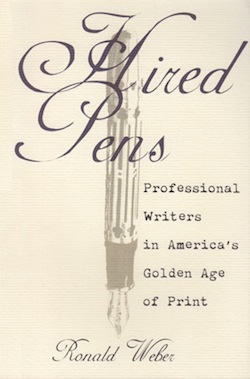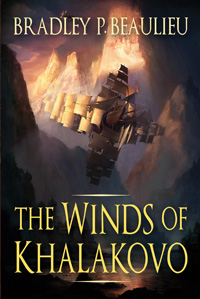Making it on the American Grub Street: Hired Pens, Professional Writers in America’s Golden Age of Print
 Last month I posted here about Researching the Habits of Highly Prolific Authors for a book I’m working on. Black Gate reader John Hocking kindly suggested in the comments section that I read Hired Pens: Professional Writers in America’s Golden Age of Print, by Ronald Weber. I took him up on his advice and I’m sure glad I did.
Last month I posted here about Researching the Habits of Highly Prolific Authors for a book I’m working on. Black Gate reader John Hocking kindly suggested in the comments section that I read Hired Pens: Professional Writers in America’s Golden Age of Print, by Ronald Weber. I took him up on his advice and I’m sure glad I did.
This book looks at the careers of writing and editing from the nation’s earliest days until the end of World War Two. Weber shows us a parade of successful writers and editors — many well-known to this day, many more now forgotten — who found success in the ever-changing market for American popular periodicals.
Until the middle of the 19th century, American writers were hampered by the lack of international copyright laws. Newspaper and magazine editors filched English publications for free and saw no reason to pay homegrown talent. As the population grew and both American and British writers managed to get their governments to set up legal barriers to such theft, the market for American writing blossomed.
These writers certainly didn’t waste their time moaning about their lack of inspiration and hoping the muse would visit them. As prolific and successful Western writer Zane Grey said in a letter to a friend:
This morning I had no desire to write, no call, no inspiration, no confidence, no joy. I had to force myself. But when I mastered the vacillation and dread, and had done a day’s work — what a change of feelings. I had a rush of sweet sensations.
This is a common thread throughout the book. In example after example, we are shown that writer’s block is a myth and that writers should not — indeed, must not — sit around all day twiddling their thumbs. These writers worked hard.
 Selling novel-length fiction is tough. Really tough. Anyone who’s been in it for any length of time can tell you how competitive it is, how quickly the rejections can stack up, how frustrating it can be to get someone to even look at your manuscript. If you’re like me, you’ve tried submitting dozens of query letters in hopes that someone will at least ask for a few pages of the work itself. I mean, that’s fair, right — to at least look at the stuff before you reject it?
Selling novel-length fiction is tough. Really tough. Anyone who’s been in it for any length of time can tell you how competitive it is, how quickly the rejections can stack up, how frustrating it can be to get someone to even look at your manuscript. If you’re like me, you’ve tried submitting dozens of query letters in hopes that someone will at least ask for a few pages of the work itself. I mean, that’s fair, right — to at least look at the stuff before you reject it?